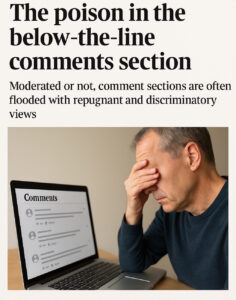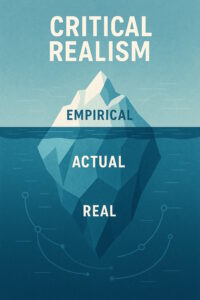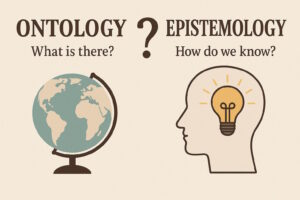
Below the Line: The Structural Violence of News Comment Sections
Comment sections are designed – both algorithmically and editorially – to reward anger, blame, and divisive language. This erodes civic trust, reduces democratic participation, and fosters cynicism towards both media institutions and social solidarity.

Assessment Integrity or Linguistic Exclusion? AI, Viva Exams, and Educational Justice
Viva-style exams are promoted as an AI-proof assessment solution, but do they reinforce class, linguistic, and neurodiversity exclusions? This sociological analysis unpacks how language, power, and educational justice intersect in the AI age.

Critical Realism Explained: A Guide for Sociology Students
A beginner’s guide to critical realism in sociology. Learn about layered reality, structure and agency, emergence, and reflexivity, with real-world examples for first-year sociology students.

Beyond the Echo Chamber: Rescuing Critical Thinking in the Digital Age
Explore how digital media, educational trends, and ideological conformity are eroding critical thinking. This article examines the sociological roots of this decline and argues for the urgent revival of independent thought as a civic responsibility.

Explaining Ontology and Epistemology: Foundations of Sociological Thinking
A clear, student-friendly introduction to ontology and epistemology in sociology, exploring their meaning, significance, and practical application in research design.

The Crowd and the Cloud: Death of Expertise in the Digital Age
An in-depth sociological analysis of the erosion of trust in expertise, exploring how digital platforms, cultural individualism, and institutional failures have reshaped public understanding of knowledge and authority.

Credentialism and the Crisis of Education: Why Experience Still Matters
Credentialism has transformed education into a race for qualifications. This article critiques its impact and champions experiential learning for real equity.

Society Wasn’t Built for Us: A Bourdieuian View of Neurodivergence
Exploring how Pierre Bourdieu’s theories of capital, habitus, fields, and symbolic violence reveal the hidden barriers faced by neurodivergent people.

Taste and Distinction: How Class Shapes What We Like
How does social class shape taste? This article explores Bourdieu’s concept of cultural capital, Goffman’s impression management, and contemporary critiques of taste hierarchies, gatekeeping, and cultural gentrification.

Beyond Weber, Marx, and Orwell: The Rise of Digital Neofeudalism
Has the modern world outgrown Weber’s iron cage, Marx’s alienation, and Orwell’s surveillance state—only to enter a new form of control? In an era where tech monopolies act as digital landlords, individuals no longer own but rent, their lives dictated...
Thinking Sociologically is a sociology blog dedicated to exploring the complexities of society through a critical and analytical lens. It serves as a platform for discussing key sociological theories, contemporary social issues, and the hidden structures that shape our daily lives.
The blog covers a wide range of topics, including power dynamics, inequality, social change, culture, identity, and globalisation. Integrating classical and modern sociological perspectives—from Marxist and feminist theories to postcolonial and digital sociology—provides readers with a deeper understanding of how society functions and evolves.